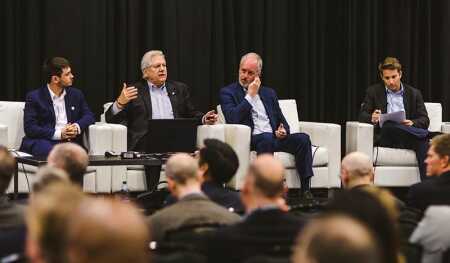
From left to right: Jack Sibley, technology and innovation strategist, real estate, Nuveen; John Gilbert, EVP and COO, Rudin; Michael Spies, senior managing director, Tishman Speyer; and moderator Dave Bragg, managing director, Green Street Advisors, speaking at the 2019 ULI Spring Meeting in Nashville.
A new generation of innovative software platforms can do everything from monitoring buildings’ energy and water use in real time to providing tenant workforces with on-site access to medical treatment and other quality-of-life-enhancing services, according to panelists at ULI’s 2019 Spring Meeting in Nashville. Those applications, collectively known as proptech, could dramatically alter the commercial real estate business by creating new ways to generate value for tenants, and it could make buildings more sustainable and efficient as well.
John Gilbert, senior vice president, chief operating officer, and chief technology officer of Rudin Management, one of the biggest private real estate firms in New York City, described how his company created what he called the equivalent of an iPhone’s operating system for its portfolio of buildings. NANTUM, as the software application is called, provides a single dashboard that continuously monitors factors such as occupancy, indoor temperature, steam consumption, safety status, and other variables.
A glance at the dashboard can tell Gilbert that 19,000 workers are still in their offices at a given moment, or that the portfolio collectively has consumed 254,000 gallons (962,000 liters) of water on a given day. “That is in real time, not static data,” Gilbert said. In addition, it is possible to use analytics to predict future performance.
The software enables Rudin Management to spot inefficiencies and make adjustments, such as slowing air-conditioning systems when occupancy dips during lunch breaks and readjusting it as workers return. NANTUM enables the company to save $5 million a year in energy costs, Gilbert said. In addition, it has reduced the number of “hot and cold calls” from tenants, because air conditioning and heating can be adjusted quickly when they stray from acceptable ranges, before office workers actually notice any discomfort.
This panel shared cutting-edge but market-ready technology solutions driving value in buildings today and discussed how future technologies and tools will make buildings even smarter, healthier, and more resilient. #ULISpring https://t.co/hN6xt9LB8w pic.twitter.com/x3hDavQdWo— Urban Land Institute (@UrbanLandInst) April 18, 2019
Another panelist, Michael Spies, senior managing director of Tishman Speyer, a global developer, operator, and fund manager with an $88 billion property portfolio, described a software platform called Zo, which provides tenant workforces with a wide range of quality-of-life services through a smartphone app.
“Yoga, meditation, chair massages—all these things can be brought into the office, or into spaces that we’ve created in the building,” Spies said.
Zo also gives workers easy access to nurse practitioners who can provide treatment right in their offices, eliminating the need for them to leave the workplace to get health care. “People get sicker because it’s too much of a hassle to see somebody and get a prescription,” Spies said. With Zo, workers can get appointments on short notice. Additionally, the application provides access to services such as backup daycare, and enables workers to connect with other people in the building who share their interests, whether it’s photography, music, or running.
Spies said that Zo aims to create value for corporate tenants who are trying to find solutions to improve their workers’ job satisfaction and enable them to be happier and more productive.
“It’s too early to know the economic impact, but if you’ve heightened employee satisfaction, the likelihood of a company making a move [elsewhere] is diminished,” Spies said. He envisioned that the value created by Zo would make tenants willing to pay higher rents.
Gilbert said that his company created NANTUM to avoid having to use multiple dashboards to monitor its systems. He cautioned that real estate operators need to carefully control the use of data gathered in their buildings and be diligent about cyber security.
This and all other sessions discussed at the 2019 Spring Meeting are now available for members in Knowledge Finder.





